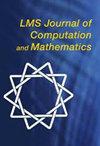非单调迟滞参数微分方程的振动
Q1 Mathematics
引用次数: 5
摘要
考虑一阶延迟微分方程$$\begin{eqnarray}x^{\prime }(t)+p(t)x({\it\tau}(t))=0,\quad t\geqslant t_{0},\end{eqnarray}$$,其中$p(t)\geqslant 0$和${\it\tau}(t)$是正实数的函数,例如${\it\tau}(t)\leqslant t$代表$t\geqslant t_{0}$和$\lim _{t\rightarrow \infty }{\it\tau}(t)=\infty$。在迟滞参数非单调的假设下,当已知的振荡条件$$\begin{eqnarray}\liminf _{t\rightarrow \infty }\int _{{\it\tau}(t)}^{t}p(s)\,ds>\frac{1}{e}\end{eqnarray}$$不满足时,建立了一个新的振荡判据$\liminf$。最后给出了一个算例。本文章由计算机程序翻译,如有差异,请以英文原文为准。
Oscillation of differential equations with non-monotone retarded arguments
Consider the first-order retarded differential equation $$\begin{eqnarray}x^{\prime }(t)+p(t)x({\it\tau}(t))=0,\quad t\geqslant t_{0},\end{eqnarray}$$ where $p(t)\geqslant 0$ and ${\it\tau}(t)$ is a function of positive real numbers such that ${\it\tau}(t)\leqslant t$ for $t\geqslant t_{0}$ , and $\lim _{t\rightarrow \infty }{\it\tau}(t)=\infty$ . Under the assumption that the retarded argument is non-monotone, a new oscillation criterion, involving $\liminf$ , is established when the well-known oscillation condition $$\begin{eqnarray}\liminf _{t\rightarrow \infty }\int _{{\it\tau}(t)}^{t}p(s)\,ds>\frac{1}{e}\end{eqnarray}$$ is not satisfied. An example illustrating the result is also given.
求助全文
通过发布文献求助,成功后即可免费获取论文全文。
去求助
来源期刊

Lms Journal of Computation and Mathematics
MATHEMATICS, APPLIED-MATHEMATICS
CiteScore
2.60
自引率
0.00%
发文量
0
审稿时长
>12 weeks
期刊介绍:
LMS Journal of Computation and Mathematics has ceased publication. Its final volume is Volume 20 (2017). LMS Journal of Computation and Mathematics is an electronic-only resource that comprises papers on the computational aspects of mathematics, mathematical aspects of computation, and papers in mathematics which benefit from having been published electronically. The journal is refereed to the same high standard as the established LMS journals, and carries a commitment from the LMS to keep it archived into the indefinite future. Access is free until further notice.
 求助内容:
求助内容: 应助结果提醒方式:
应助结果提醒方式:


